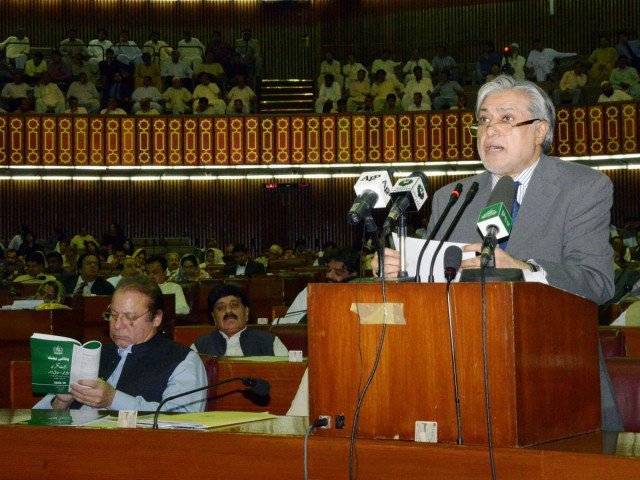Finance Minister Ishaq Dar on Friday presented the federal budget (2017-18) with an outlay of Rs4.75 trillion, reported Waqt News.
While presenting the budget for the financial year 2017-18, the finance minister said that GPD growth has been targeted at six per cent. He added that Rs1,001 billion have been allocated for Public Sector Development Programme.
Dar said the government has allocated Rs400 billion for energy projects. The government plans to add another 10,000 megawatts of electricity to national grid next year, he added.
He said the government has allocated Rs920 billion for defence, up from Rs860.1 billion.

Speech in bullets
"The provincial share in federal taxes is estimated at 2,384.2 billion rupees"
"Rs180bn allocated for CPEC projects"
"Govt decides to allocate Rs49bn for health sector"
"Tax collection by FBR is estimated at Rs4,013 billion"
"Minimum wages have been increased from Rs14,000 to Rs15,000"
"10 percent increase in pensions of government employees"
"30% tax decrease for corporate sector"
"Custom duty on smart phones decreased from Rs1,000 to Rs650"
"Market capitalisation of stock exchange increased from Rs51 billion to Rs97 billion in four years"
"Custom duty and sales tax on agricultural machinery have been withdrawn"
"Rs35.7bn for Higher Education Commission"
"Fiscal deficit has been brought down from 8.2% in 2012-13 to 4.2% this year due to increased tax collection"
Opposition threatens walkout
Earlier, opposition parties chanted slogans against the ruling party with Opposition Leader Khursheed Shah saying the government should focus on the rights of farmers.
Shah said opposition parties will stage a walkout if the government did not fulfill the demands of the farmers.
Economy grows at highest rate in decade
Dar had earlier said Pakistan's economy expanded almost 5.3 percent in the last year as gross domestic product crossed $300 billion for the first time.
But a report unveiled by the finance minister also noted that headline inflation was up 4.1 per cent compared to 2.8 per cent in the previous financial year, while the tax-to-GDP ratio - a key indicator of self-sufficiency - remains a relatively low 10.7 per cent.
"We are now targeting six percent growth for next year," he said.
Dar added the per capita income grew by 6.4 per cent in the financial year 2017 to $1,628.80 as compared to 1.1 per cent last year.
Confidence in Pakistan is growing, with the International Monetary Fund saying in October that the country had emerged from crisis and stabilised its economy after completing a bailout programme.
Pakistan's credit rating has also improved, though foreign investment remains poor compared to its South Asian neighbours.
Economists believe the country will need to register sustained growth of six to eight per cent over several years to make a significant dent in poverty and provide enough jobs for its youth.







